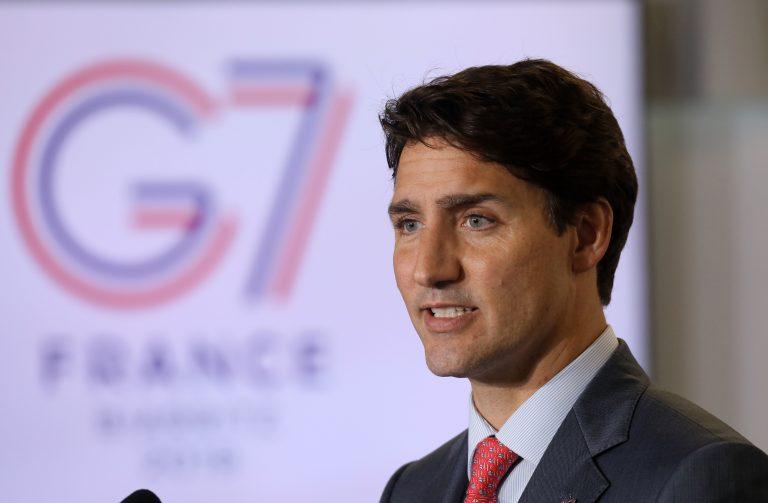When the Canadian PM met a guy who couldn’t buy Greenland
Politics Insider for Aug. 26: Trudeau meets Trump at the G7, central bankers meet in Wyoming, and America’s role as global agenda-setter meets its end

Prime Minister Justin Trudeau addresses media representatives at a press conference in Biarritz, south-west France on Aug. 26, 2019. (LUDOVIC MARIN/AFP/Getty Images)
Share
Welcome to a sneak peek of the Maclean’s Politics Insider newsletter. Sign-up at the bottom of the page to get it delivered straight to your inbox.
Second thoughts? Always: Remember the close of last year’s G7 summit in Charlevoix, Que., when Donald Trump went on a Twitter tirade against Justin Trudeau? So unpopular is the president in Canada that the moment delivered Trudeau his best bounce in the polls in all of 2018. After Trudeau and Trump met yesterday at this year’s G7 confab, in Biarritz, France, nothing so newsworthy ensued. They talked about China’s detention of two Canadians. They both boasted a bit about the new U.S. Mexico Canada Trade Agreement. But that focus on trade was a little awkward, since the main business of this summit amounts to the six other leaders trying to get Trump to ease off on this escalating trade conflict with China. Asked by reporters if he has any second thoughts about the tariff feud that’s rattling the world economy, Trump said, “I have second thoughts about everything.” [Bloomberg]
Undaunted, undented: Since the G7 is Trudeau’s last big outing on the world stage before this fall’s election campaign, he has been trying at every turn to look like a PM who deserves a second term. And the Aug. 14 release of the Ethics Commissioner’s damning report on his handling of the SNC-Lavalin affair briefly made it seem like the summit might be a badly needed moment for Trudeau to try to rebound. However, as Philippe Fournier, our resident surveyor of surveys, reports, a spate of polls published since Trudeau was found to have violated the Conflict of Interest Act all show him coming up remarkably unscathed:
“These federal polls have this much in common: all of them were in the field after the release of the Ethics Commissioner’s report and none of them saw a dent in voting intentions for the Liberals (compared to each firm’s previous poll).” [Maclean’s]
Another summit, another Canadian: While the Trudeau-à-Trump tête-à-tête didn’t generate much buzz, another Canadian at another elite-echelon get-together was drawing plenty of attention. Bank of England Governor Mark Carney (formerly Bank of Canada gov, pride of Fort Smith, NWT), used a speech at the annual central bankers gathering at Jackson Hole, Wyoming, to urge the creation of a new global currency to replace the U.S. dollar as the dominant one for international transactions. “Blithe acceptance of the status quo,” Carney said, “ is misguided.” His proposal isn’t just a reaction to the White House’s current occupant, but there’s no doubt Trump’s recklessness has many pondering if a world order anchored in the assumption of U.S. stability makes sense anymore. [Bloomberg]
Who knows how world institutions might ultimately be reformed in the wake of the wackiest presidency ever? But our Scott Gilmore takes a late-summer look at the what legacy Trump will have secured—if he loses next year’s U.S. presidential election. There’s a lot of big stuff to consider, many horrendous missteps and even more offensive Twitter missives, but Gilmore points to a certain putative real estate deal as worthy of consideration as a watershed in America’s standing:
“When the president proposed buying [Greenland], Denmark simply rolled its eyes, figuratively and literally. Even when the president called the Danish prime minister a ‘nasty woman’, no one really cared—illustrating a dramatic shift in America’s role in the world.” [Maclean’s]